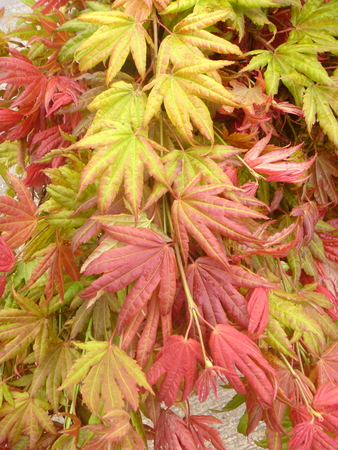What's New and Exciting February 2025 — 02/20/2025

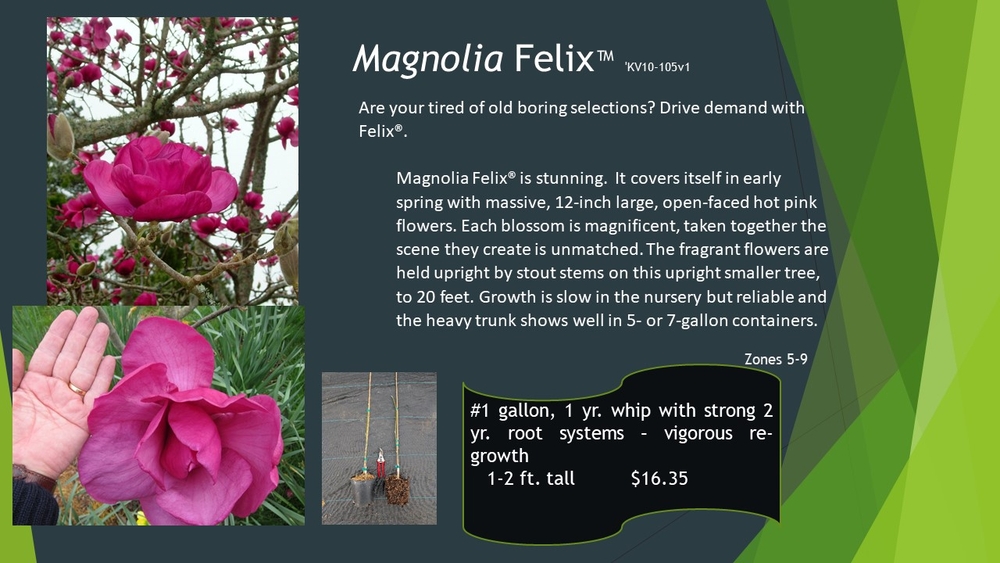
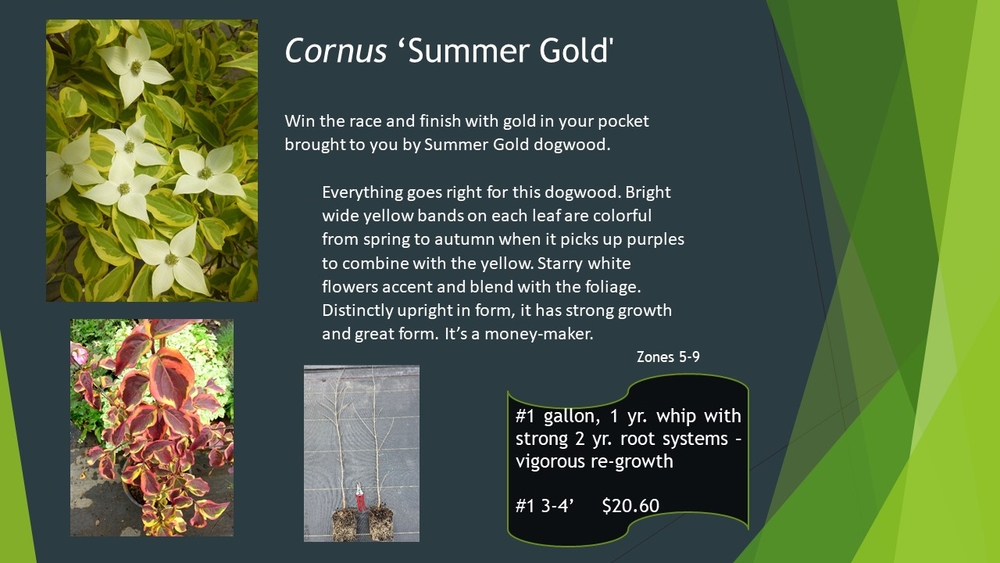

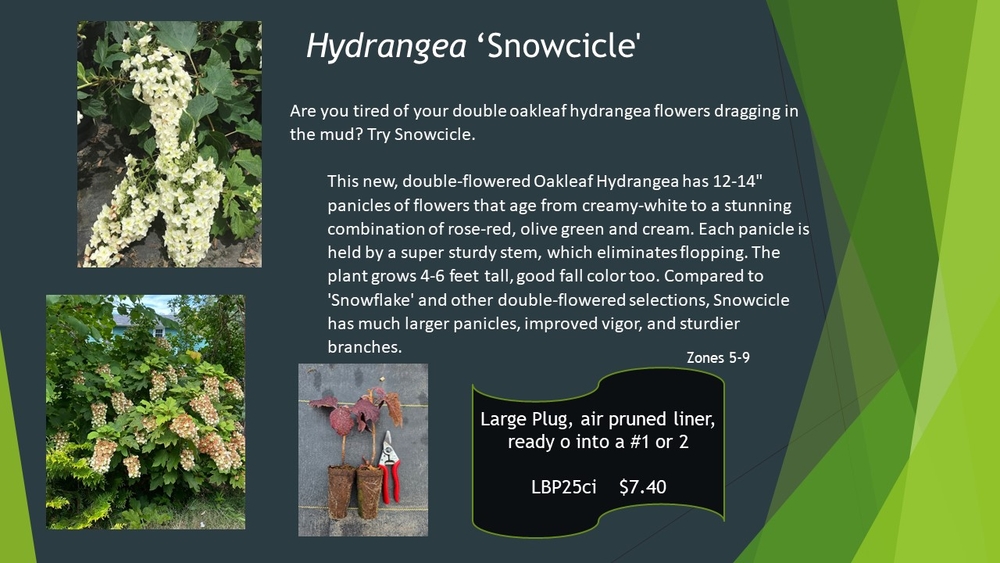
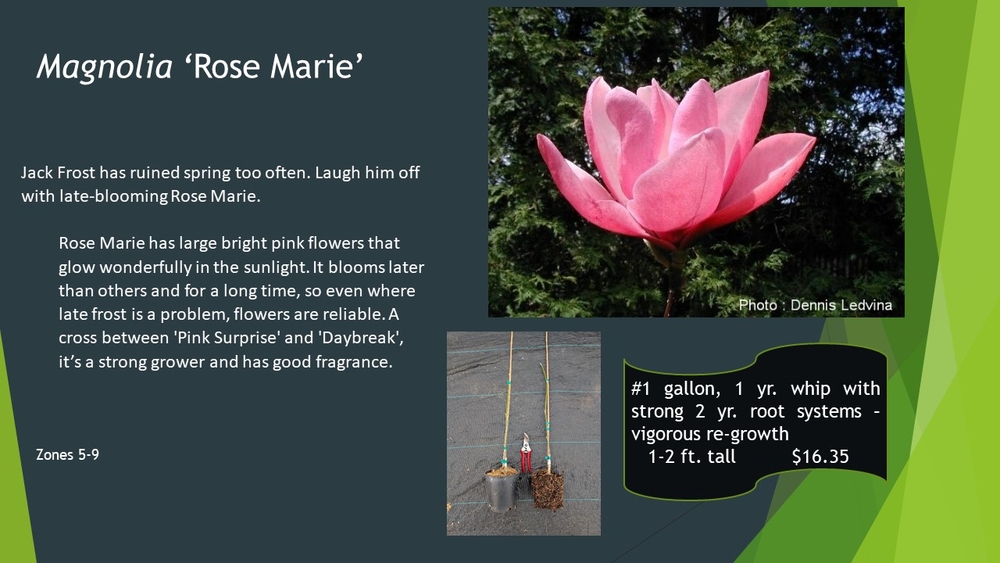
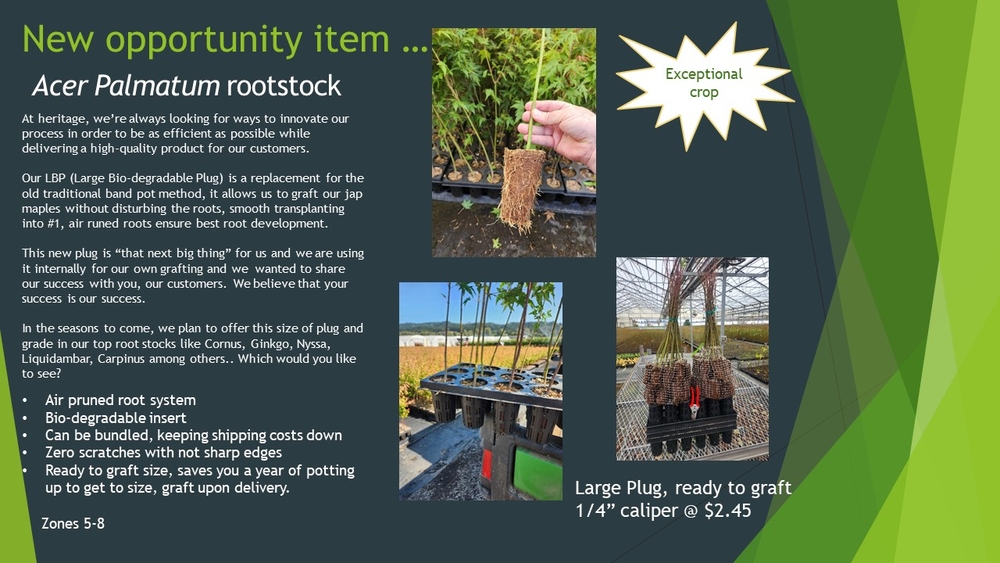

Garden Candy® ITOH Peonies — 01/22/2025
We are excited to bring Garden Candy® series of ITOH peonies to the market in cooperation with our friends and partners at Plants Nouveau. Everything about these plants will change what you know about peonies. Grown in gallons, zone 3 hardy, they will bloom everywhere from Alaska to North Carolina! They're resistant to mildew and deer don't like them but their huge blooms are loved by everyone.
They are in hot demand. It's not too early to order them for your late summer potting and spring sales. Order them here.


Winter 24'-25' — 01/22/2025
Several months have passed since Jolly died, but my enduring memories are of almost 50 years of companionship, good fortune, and friends we shared. My soul grief is that her life was shorter than either of us had imagined it would be.
Every day and each experience as a gift. Jolly spirit still energizes me, offers me, hope, and lifts my own spirit. I find great joy and simply telling ALL my friends, “I love you.” or sometimes, “Please forgive me."

As Italia takes the reins of heritage, it connects my head and my heart to know he’ll honor Jolly‘s high expectations. We’ve invested a considerable amount of cash in recent years to upgrade many aspects of container production. Our potting line is more efficient and we’re converting larger pots to the air pruning style. We added 10 new hoops, almost an acre and a half. These investments will help you to count on even more robust liners, achieve, faster, turn times, and expect improv rooting into your own pots.
Most important, you know I have 100% confidence on Octavio to lead heritage in a fashion that honors our commitment to your success.
This may be my final catalog letter, but not my “goodbye “. I have Octavio‘s back, including my regular communications with him and verifying he doesn’t take on more than he can reasonably handle. We recently re-hired Eric Hammond, who returns with solid Heritage experience and gives Octavio major administrative and head grower assistance.
We’re here for you. Lots of changes are in the works, exciting improvements, new talent, and facilities.
We have your back, too.
Respectfully,
Mark


December 2021 List and Letter — 12/03/2021
December 2021
Dear Friends,
Uncertainty is to be the one certainty we can count on, labor & supply “chains” being jammed up. But let’s remember: we DO have considerable control over our own strategic goals and how to implement them with focused forward thinking. “Just in time inventory” has become an oxymoron. What a strange concept that now seems. We have to see quite a ways ahead, and around more corners too.
Like you, we’ve taken our own hard look at what we can grow with fewer labor options. We’ve cut marginally profitable items. Next, we’ll limit larger field-grown transplants of some primary items like field-budded maples & dogwoods to contract production only. We must reduce our dependence on field labor. If your order includes bare-root field transplants, especially in larger sizes, let’s talk. We’ll remind you, but begin to consider how/if it makes sense for you to bring in smaller liners to get them under your control, perhaps even a year earlier than you might have considered before. Help us understand your critical needs and what flexibility you may have on liner sizes.
Finally, we have temperatures now after Thanksgiving nearly in the 60’s outside today, a record for Oregon. Family in Kansas City have temps in the lower 70’s. This climate issue will continue to frustrate us all as extremes of temperature and rainfall become the norm. It is conceivable that we could be in the teens within 10 days, recalling the opposite 50-degree swing in temperature last summer when we endured 117 degrees and dying field budded maples. Whew!

So we’re protecting what we’ve grown all year long for you by harvesting field plants earlier than usual, getting them graded and cold-stored at 36°F under ZeroTol® - injected fog. Our crews are all healthy; we’re 100% vaccinated and have had not a single case of Covid originate within the nursery. We take care of each other here so we can take care of you/your orders. Count on that, and transparent communication from us at all times.
THANKS for your patience as we have taken a very careful inventory of stock late this fall in order to be able to confirm your order.
Have a Christmas and New Year holiday season filled with good rest, health, and gratifying time with family and friends. We hope to see many of you at MANTS in Baltimore.
All good wishes,
Mark, Jolly, & Staff

January 8th Focus Plants — 01/08/2021
Acer miyabei
Hardier than Acer campestre, to which it is most often compared, but of more appealing form and therefore requiring far less pruning in cultivation. Lacks the invasive character and obtrusive size of Acer platanoides. Very hard to find, it is an excellent urban tree. The best example in America (right) is at the Morton Arboretum in Chicago, a broadly upright tree at 30 ft. tall, dubbed State Street™. … a handsome plant by any measure.
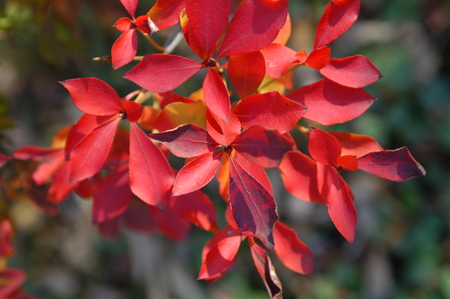
Enkianthus perulatus
Rare, choice upright shrub with heather-like, pure white flowers borne in clusters in April/May. Slender branches complement small leaves, giving it a delicate texture worthy of specimen status in any garden. In the company of azaleas, Kalmia, and camellias, it prefers an acidic soil in partial shade, and puts on a show of fall color to rival any of the best.
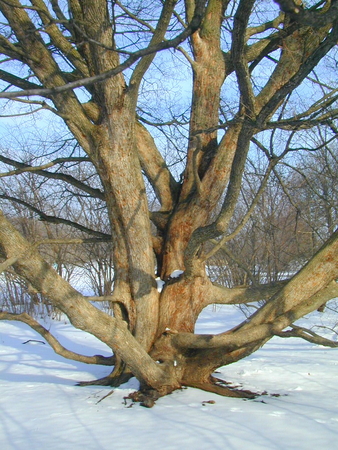
— 12/22/2020
January 2021
Dear Friends,
The prevailing sentiment seems to be that most are happy for 2020 hindsight. But while individuals and whole industries suffer the effects of Covid, we in the nursery trade are the beneficiaries of most people staying home and upgrading their “family space” - indoor and out.
For nurseries and garden centers, does it get better than this? Probably not, but not worse for plenty of reasons. Consider these few:
- As spring approaches the virus should abate. Wide vaccine distribution will surely give people relief and hope for a better summer than last.
- Low interest rate housing demand is high, fostering historic home prices that benefit the construction and landscape trades. Consumers who have a secure job are paying down debt. Young families are moving into homes vacated by aging boomers. All are auspicious for the nursery trade.
- Will investors re-purpose urban office and commercial space for expanded housing options? Where feasible, it seems likely, supporting demand for select landscape plants.

- Once Covid recedes, we’ll embrace in-person collaboration and sharing ideas over lunch, happy hour, and long overdue, in-person visits. Computer screens are no panacea, despite the present utility of Zoom. Grandparent travel alone will support a bump in the economy; so count on us boomers yet again!
- Pent-up demand of all kinds will generate a bounce in the retail economy and important service trades. Can you imagine restaurant rebounds next summer and fall for those that have been cash-prudent, are creative, and just survive this winter?
Current nursery liner purchases are for sale more than a year out, on average. So it seems a great investment to pursue a growth strategy within your area of expertise and market niche. Buy liners now, or reconcile your business to a SOLD OUT sign on the door. Pretty obvious … it’s decision time. Lots of value items to choose from in this list. Take the time to give us a call about any items of interest.
Browse this list and book your order with us as soon as you feel confident of your budget, labor and space limits. Add to your present order when other liner suppliers cut your order with them in half. Trust us to be your reliable supplier with the integrity you have come to know from Heritage for 40 years.
From our family to yours, have a safe and HAPPY holiday season.
Mark, Jolly and Staff

November 2020 Availability list — 11/20/2020
Late Fall 2020
Dear Friends,
Happy Thanksgiving from Oregon! We choose to be thankful for all our many blessings … especially in this year of challenges to our sanity like none other.
Here in Oregon, we’re happy because wildfire is no longer on our doorstep, and the 2-week pall of choking smoke is behind us. Election ads are over; whew! We get to work outside where Covid risks are reduced. And almost all of us have had a banner production and sales year.
It seems that the fall colors are more vivid this year than ever, and our staff have been AMAZING, covering for each other and adapting to daily issues with calm and wisdom.
We note your orders with us to date are far earlier than in seasons past, a result of big bumps in garden center demand and low-interest rate housing construction. So it brings us to our own availability.
Like you, we’re sold out of a lot of items. So consider the many line items below - before many of those, too are booked.

Fact is, as supplies tighten, it’s an opportunity, right? Take a calculated, careful risk: choose a selection of new items to engage your customers on items that may offer each of you a chance for more profit, items in addition to the commodity stuff. Substitutes and new choices offer us all that chance to discover for ourselves and our clients those gems we may overlook within plain sight. This is our specialty after all, so trust us to help you make appropriate choices for your zip code and your own market niche.
On Veteran’s Day there was a news feature about an Iowa fellow still flying his small plane –the oldest pilot in the world at age 99. Jolly and I were struck by his parting video comment, essentially: “Take a risk, and keep going forward.” …. wise advice from a fellow who has the experience to know.
So take a risk on some new items and depend on us for the basics, too. Order ahead for next season if you must.
We’ve got your back.
Mark, Jolly and Staff

November 2020 Focus Plants — 11/06/2020
Cornus kousa var. chinensis 'Snow Tower'®
A perfect street tree, given its narrow form - only 7 to 8 ft. wide after many years. In smaller landscapes, its columnar habit minimizes the likelihood of its crowding out other trees and perennials. Bear in mind all the additional features you've come to expect from Chinese Dogwood:
- disease-free foliage
- adaptability to nearly region within USDA Zones 5-8
- sensational creamy flowers – what a long-lasting show!
- attractive yellow and red fall fruit and foliage
- transplant reliability
Finally, with its columnar shape, you can stuff more containers into a can yard or field – more profit per square foot than for spreading trees.
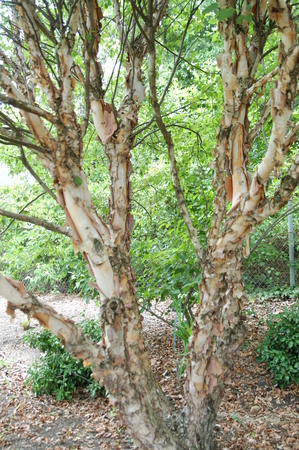
Betula nigra Heritage® 'Cully'
These lightly branched field transplants will explode with new growth next spring, so pot them up in a #10, at least. Triple them up in a #20, or plan for a mix of sizes to fit your own sense of demand.
Compacted or wet soils are often a challenge for landscape firms, so it pays to have these dependable trees ready for sale year-round at a handsome profit.
Ask for more details on additional items we still have before supply gets tight.
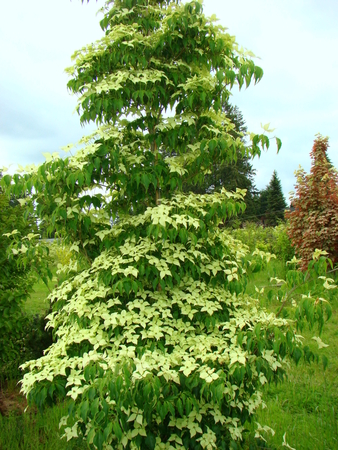
October 2020 Focus plants — 10/30/2020
For 2021, consider two American native trees noted below, one full size and one diminutive, more shrub-like.
Enhance your landscape tree selection. Keep loyal customers interested, reminded why they depend on you for the best in woodies, the newest varieties and the tried & true classics - hard to find connoisseur items that you can price at a significant premium.
Aesculus parviflora
Bottlebrush Buckeye is a
large shrub, usually 8-10 ft. tall. It tolerates deep shade and bears striking,
upright narrow bottle brush-like blooms of gorgeous white set against the late
spring foliage. Disease-free leaves perfectly accent the flowers. This is a
surprisingly hard to find plant for a garden corner or border beneath larger
trees, and makes excellent songbird nesting habitat. Although its small stature
might suggest a tender nature, it’s remarkably hardy, tolerating winter lows to
- 31°F.
Count on Heritage to offer this unusual native annually, but reserve your
supply early, since we almost always sell out. This is a choice American native
to reserve for your best customers.
Liquidambar styraciflua 'Gold Beacon'
Unique golden foliage in
this American native sets it apart from all other sweetgums. Foliage emerges
light green and quickly changes to golden color without summer leaf scorch.
Autumn foliage is red and orange; growth is only a little slower than typical of
the species.
Sweetgums aren’t head-turners, given their widespread landscape use and
familiarity, but visitors to our greenhouse facility landscape always ask what
it is, having never seen such a healthy specimen of bright golden color and
no burnt foliage.
Simply put, this tree sells itself, but you do have to get them into your
inventory. Have us set aside yours today – give us a ring, or reserve them with
our online order form.
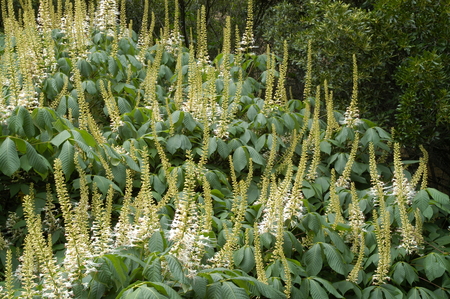
October 2020 Focus Plants — 10/19/2020
Dear Friends,
To choose just two focus plants from our wide selection of amazing woodies is a challenge. So for fast-turn varieties, our staff chose 3-4 feet tall trees that highlight these characteristics always in robust demand:
COLOR: Acer shirasawanum Moonrise™ 'Munn 001' PP16,718
Among hundreds of varieties of Japanese maples, this remarkable variety is distinguished for its orange-red new growth and completely trouble-free nursery performance. Field visitors here see it from a hundred yards off with, "What's THAT?"
Such a classy maple merits pairing with an upscale container: perhaps a cedar box or large glazed pot set by a front entry or on the deck below a kitchen window. For the field, consider a grow bag or pot-in-pot for year-round sales.
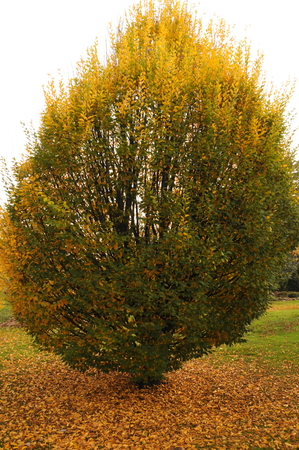
FLEXIBILITY: Carpinus betulus 'Fastigiata'
Let's put it this way: have you ever seen a dead one? Drought tolerant, soil adaptable, dependable, and a vigorous grower, it's the one nursery "fullback" tree performer that picks up 6 yards on every carry. These whips are prime candidates for you to line out or pot up for '21 sales in #5-7 pots. Demand for these liners has tripled in the recent few years, as growers experience their low labor input cost and complete sell-through.
